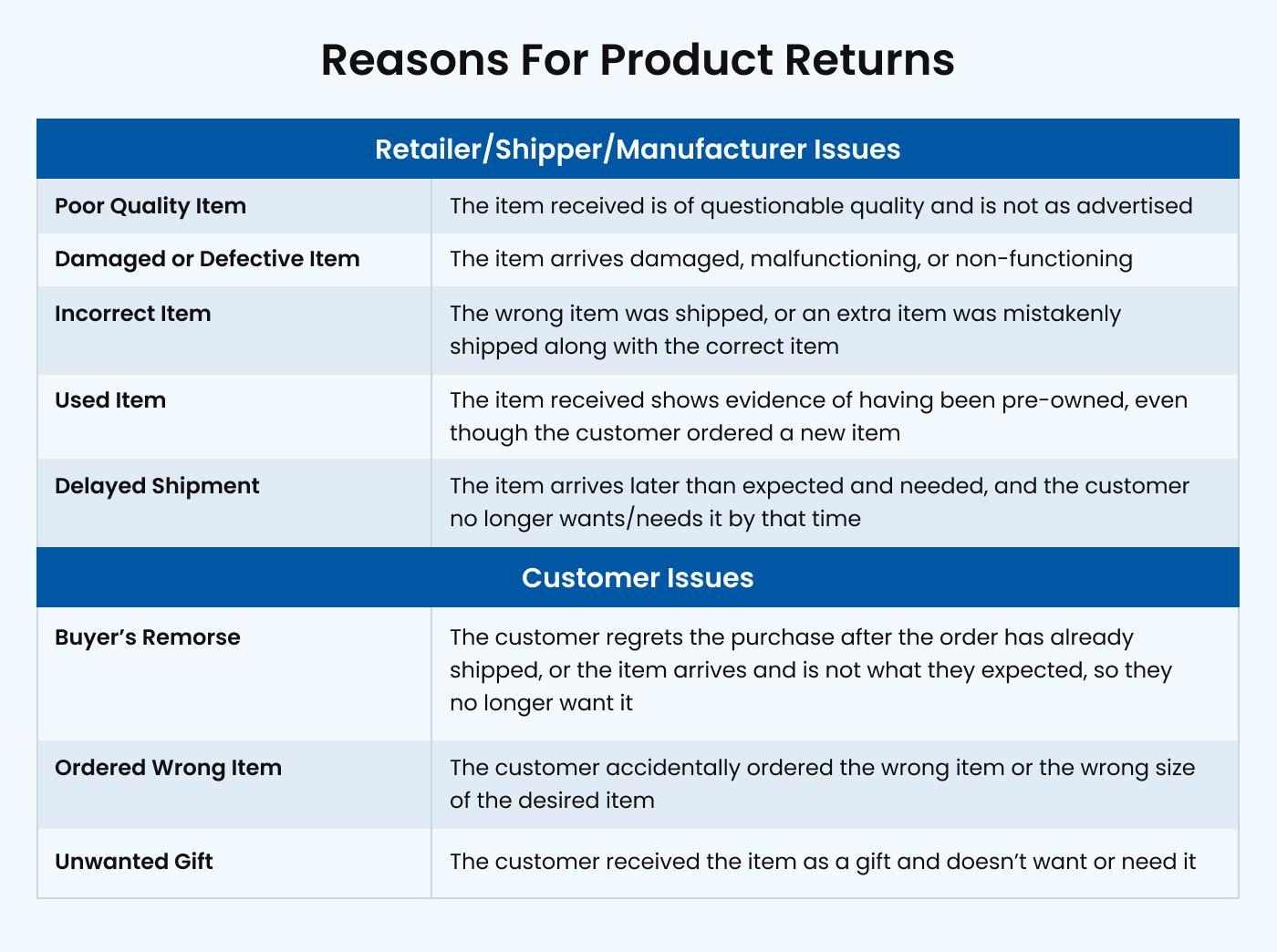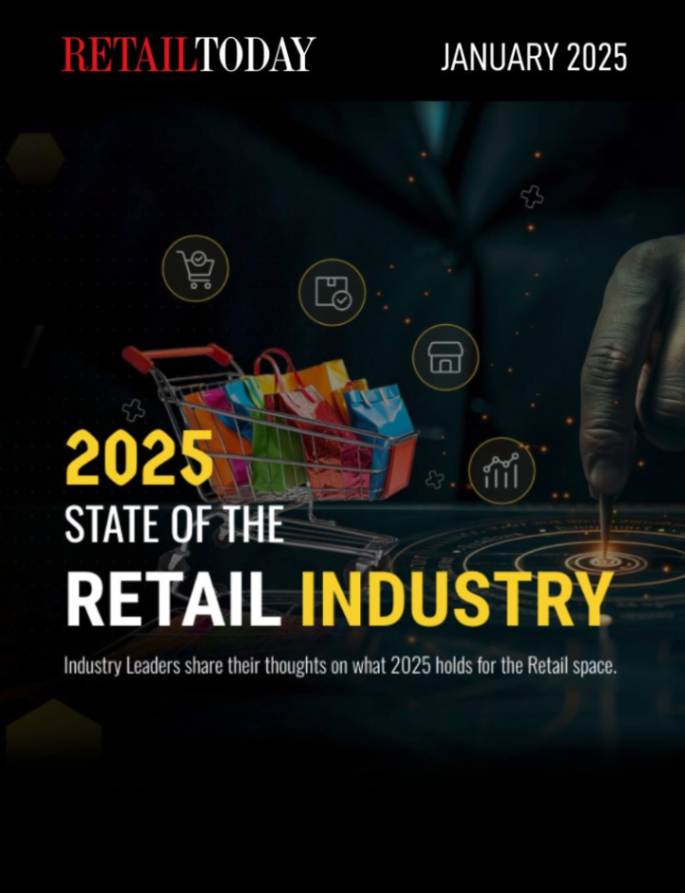
Returns are inevitable, but customers will walk away if they find the process painful. 95% may leave a brand due to a poor returns experience. Many will decrease or stop online shopping altogether due to certain return policies (or a lack of certain return policies).
However, a well-managed returns process can flip disappointment, prevent irritation, and win customer loyalty and referrals.
How can you maximize your customers’ joy during a return while minimizing your losses? Let’s start with two popular return options — in-home pickup and in-store returns.
Read on to learn the benefits of these return options and how to leverage them best to make your customers (and your business) happy.
How do return options delight customers?
73% of customer returns are due to issues outside the customer’s control. So, they shouldn’t have to bear the consequences of rigid, confusing, or inconvenient return protocols.
Returns rectify an issue that the retailer, manufacturer, or shipper was responsible for in the first place. Common problems that initiate returns include:
- Damaged items
- Defective items
- Incorrect items
- Poor quality items
- Used items (when a new, unused item was ordered)
- Delayed shipments

Taking responsibility and offering convenient solutions to choose from diffuses an irritating situation. It helps shine a more positive light on your brand and combats the impression left by the order issue.
Of course, customers also make returns for reasons entirely out of the retailer’s control:
- Buyer’s remorse
- Incorrect purchase (e.g., ordered the wrong size)
- Unwanted gift
In these cases, offering return options allows you to accommodate customers who are dissatisfied with their purchase. The flexibility improves customer experience. It spares them the choice between keeping an unwanted item and navigating a rigid return experience.
Return options also encourage customers to purchase in the first place. 86% of customers check a brand’s return policy before making a purchase, and half abandon their carts due to a lack of convenient return options.
Customers feel more confident shopping with a brand when they know that returns, if necessary, are smooth, quick, and painless.
With this confidence in mind, customers exhibit greater brand loyalty. They buy more, buy again, and refer others to buy from you. And as customer satisfaction increases, your revenue increases.
The benefits of offering home pickup
Most consumers find mail returns annoying, and over 40% would prefer to sit in rush hour traffic over making a mail return. Naturally, home pickup is a more favorable option. What do customers and retailers love about home pickup?
Customer satisfaction
No lines:
With in-home pickup, customers don’t have to wait in long lines at the store, drop-off site, or post office. They don’t have to leave home if they don’t want to.
Less time commitment:
Home pickups don’t have to disrupt a customer’s schedule very much or at all. They can schedule the pickup for when they’ll be home and when it’s most convenient. Or they can schedule a pickup, package the purchase, and leave it out for pickup in their absence.
Lower cost:
Home pickups typically cost customers less than return shipping. Customers also save on transportation costs associated with dropping off a return in person.
Retailers that offer free returns send prepaid shipping labels to attach to the outer packaging. Then, the customer can schedule a free pickup through couriers such as UPS or FedEx.
Some retailers, such as Walmart, offer free home pickup returns as an in-house service for subscribers.
No packaging:
Sometimes, the packaging has already been discarded when the customer realizes they need to return their purchase. Some customers simply don’t want to deal with procuring packaging for their return. Others appreciate the option of a zero-waste return.
Box-free home pickup eliminates the need for packaging materials.
Earlier payout:
Home pickups allow for quicker processing time. This means customers get their refund or store credit sooner, usually same-day.
Retailer convenience
Quicker restock:
Returned resellable items (unopened, unused, or unworn) can be returned to inventory sooner.
Cost efficiency:
Retailers can save on transportation fees by combining multiple home pickup and delivery trips with pickups.
The benefits of offering in-store returns
While customers prefer in-home pickup to mail-in returns, 54% would rather return a purchase in person. So, what’s the appeal of in-store returns?
Benefits to customers
Cheaper returns
Customers never have to pay to return a product in-store, but many retailers charge shipping fees for returns by mail.
With or without a pickup fee, home pickup may still cost a service fee and driver tip through the carrier service used. Retailers providing the service in-house may only offer it through a paid subscription service, such as Walmart+.
Convenience
Returning in-store can be the most convenient option for customers who live, work, or pass by the retailer during their daily routine.
It’s also a more convenient option if the customer is already a frequent flier with the store and will visit it soon to shop for something else.
Immediate refund or exchange
With in-store returns, the store receives the products, evaluates them, and processes them immediately. Then, they can immediately process refunds, issue store credits, and make exchanges.
Faster overall process
In-store return is the quickest return method by far. Returning items to the retailer and receiving a product exchange or refund lasts minutes. Other methods can take hours, days, or over a week.
Benefits to retailers
- More in-store traffic: Increased brand and location awareness.
- Opportunities to delight customers with overall in-store experience: Strategic retail management that conveys brand identity and creates enjoyable, memorable shopping experiences.
- Greater likelihood of additional sales: Opportunities to cross-sell or upsell.
- Better chance of exchange vs. refund: Opportunity to search the stock for the same or similar item to exchange, thus preserving the sale.
- Ability to inspect returned items on the spot: Quicker identification of issues and return of resellable items to stock.
- Increased in-store revenue: Higher probability of the customer shopping in-store with their refund after completing their return (62% of consumers do so).
- Less operational costs: Savings on the transportation and shipping costs of mail returns and home pickups.
- Decreased risk of damage in transit: Items returned to the retailer more securely than through shipping.
How to delight customers using home pickup and in-store returns
Now, let’s look at ways to leverage your returns options to delight customers further.
Embrace technology
Technology can improve the returns process’s flexibility, convenience, and visibility. Returns management solutions include:
- Happy Returns by PayPal
- Loop Returns by Shopify
- AfterShip
- Eshopbox
- ReturnLogic
- Returnly
Use returns software to offer services, such as a returns portal, on your store’s app or website. Self-service returns enable a customer to:
- Process returns
- Automatically generate return labels or QR codes
- Schedule home pickups via services such as Uber, DoorDash, and Roadie
- Track return status and refunds
The omnichannel experience solution that DeliverySolutions offers can power such a portal and support other aspects of your returns management processes.
DeliverySolutions connects customers, returns portals, pickup services, retailers, drop-off sites, kiosks, and couriers.
Create memorable in-store experiences
83% of consumers will return to a store after a positive in-store experience, while 55% have ditched a brand altogether after one bad in-store experience.
Transform every visit to your store, including returns visits, into an experience customers look forward to and talk about. Ways to do this include:
- Inviting and intuitive store layout
- Eye-catching product displays
- Sensory engagement (visuals, music, aromas, etc.)
- Interactive and immersive experiences
- Outstanding customer service
- In-store exclusive products, deals, and promotions
Promote sustainability
Many consumers are environmentally conscious and expect businesses they support to be so. 41% of consumers will pay for a more sustainable returns method. Some ways to reduce your brand’s ecological footprint with the returns process include:
- A reverse logistics strategy that helps reduce waste and conserve resources
- Box-free, label-free returns options (such as in-store returns and box-free home pickups)
- Transportation management solutions that reduce carbon emissions
Collect customer feedback
Learn your customers’ pain points regarding returns and adjust accordingly. Collect feedback using email surveys, social media comments and polls, ratings and reviews, and focus groups.
Improve customer experience and loyalty with home pickup and in-store returns
Returns can signify a hoped-for gain turned into a loss — for your customer and your business. Change that by using the returns process to delight your customers and win their loyalty.
Transform a negative experience into a praiseworthy one with easy, flexible, and efficient returns. Revamp your returns process by homing in on home pickup and in-store returns options.
DeliverySolutions can help you seamlessly tie all your processes together. Book a demo today, and learn how DeliverySolutions enables you to dazzle your customers with top-tier delivery and returns experiences.
Ryan Caldarone is responsible for Delivery Solutions’ digital marketing and content strategy. He has over a decade of experience in B2B marketing, copywriting, and eCommerce operations. Before his work with technology companies, Ryan has experience in the energy sector with established international distributors, as well as SMBs He promotes value-focused storytelling to empower our enterprise customers and benefit retail consumers at large.






